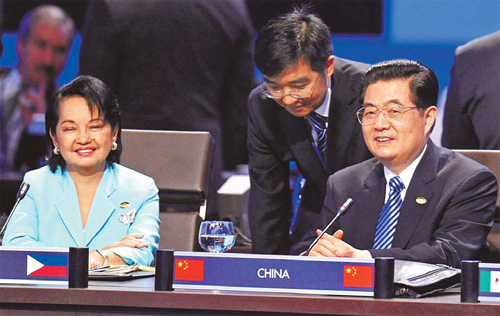Foreign and Military Affairs
China prefers diplomatic solution to Iran nuke issue
By Li Xiaokun, Wu Jiao and Wu Chong (China Daily)
Updated: 2010-04-15 07:19
 |
Large Medium Small |
WASHINGTON - China still prefers a diplomatic settlement to the dispute over Iran's nuclear program but is willing to discuss other approaches if they don't affect other countries' legitimate interests, a senior Chinese diplomat said on Tuesday.
 President Hu Jintao and Philippine President Gloria Macapagal-Arroyo (left) attend the Nuclear Security Summit at the Washington Convention Center in Washington DC on Tuesday. [Agencies]? |
"Actually there is no difference between China's current position and the position we have always stood by," Vice-Foreign Minister Cui Tiankai said at a press conference after the nuclear summit in Washington on Tuesday.
Cui, however, emphasized "the well being of the Iranian people as well as the normal economic, trade, financial and energy exchanges between Iran and many countries in the world - these legitimate needs and demands should not be undermined".
Progress has been steady but slow since US President Barack Obama told the world in early April that he expects to see the Iran issue resolved "within weeks". The Christian Science Monitor said on Tuesday that the American president now "refused to repeat his earlier call for UN Security Council action on Iran within weeks not months".
China has been under mounting pressure from the US to support a fourth round of UN Security Council sanctions on Iran, which is a highlight of Obama's nuclear and foreign policies.
But China has insisted sanctions are no use in settling the problem and called for enhanced diplomatic efforts. Experts said economic ties with Iran - the country's third largest oil supplier - are also a concern for China, and Obama said he had discussed the issue with Hu at the summit.
Obama, at his own press conference on Tuesday after the summit, said the world community has a very "reasonable approach" to allow Iran to develop safe and peaceful nuclear energy.
And "the Chinese are obviously concerned about what ramifications this might have on the economy generally," he said.
It was reported Obama had promised that the US would try to seek other energy sources for China if its energy cooperation with Iran is hampered by the sanctions.
Cui did not directly respond to the question about the reported promise on Tuesday.
When asked whether and when the UN Security Council would reach an agreement on the issue, Cui said it also depends on other non-permanent member countries of the Security Council, which "largely share the same overall goal but still have their own concerns".
Zhai Dequan, deputy director of the China Arms Control and Disarmament Association, said Beijing's support for Teheran is still unchanged.
"China has tried to prevent the new sanctions on different occasions and through different ways, but we will also talk details to minimize the possible loss. On the other hand, the Washington summit is dedicated to nuclear security issues, not Iran."
China Daily













